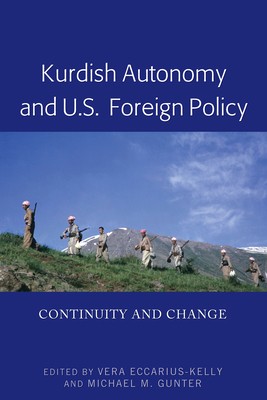
- We will send in 10–14 business days.
- Publisher: Peter Lang Inc., International Academic Publishers
- ISBN-10: 1433168022
- ISBN-13: 9781433168024
- Format: 15.2 x 23.9 x 2 cm, hardcover
- Language: English
- SAVE -10% with code: EXTRA
Kurdish Autonomy and U.S. Foreign Policy (e-book) (used book) | bookbook.eu
Reviews
Description
This book evaluates U.S. foreign policy patterns towards Kurdish movements in Turkey and Syria and the Kurdistan Region of Iraq. In the first section of the collection, U.S. foreign policy approaches are examined by comparing multiple U.S. administrations and their responses to Kurdish demands for autonomy. While Kurds have been used to advance particular policy interests, several contributors also identify challenges to Kurdish independence movements linked to ideological divisions and patronage structures. However, Kurds could benefit from political changes even if U.S. policy preferences favor maintaining established borders.
In the second section, several contributors explore the Kurdistan Regional Government's unfulfilled expectations and the fallout from the 2017 independence referendum. Consecutive U.S. administrations have been reluctant to destabilize the region, supported efforts by Turkey to co-opt the KRG, and impeded Kurdish movements in Syria and Turkey.
Finally, the third section analyzes the ways in which Kurdish movements have responded to long-standing patterns of U.S. foreign policy preferences. Here contributors examine Kurdish lobbying efforts in the United States, discuss Kurdish para-diplomacy activities in a comparative context, and frame the YPG/J's (People's Protections Units/Women's Protections Units) and PYD's (Democratic Union Party) project in Syria. Broader power structures are critically examined by focusing on particular Kurdish movements and their responses to U.S. foreign policy initiatives.
EXTRA 10 % discount with code: EXTRA
The promotion ends in 17d.13:39:21
The discount code is valid when purchasing from 10 €. Discounts do not stack.
- Publisher: Peter Lang Inc., International Academic Publishers
- ISBN-10: 1433168022
- ISBN-13: 9781433168024
- Format: 15.2 x 23.9 x 2 cm, hardcover
- Language: English English
This book evaluates U.S. foreign policy patterns towards Kurdish movements in Turkey and Syria and the Kurdistan Region of Iraq. In the first section of the collection, U.S. foreign policy approaches are examined by comparing multiple U.S. administrations and their responses to Kurdish demands for autonomy. While Kurds have been used to advance particular policy interests, several contributors also identify challenges to Kurdish independence movements linked to ideological divisions and patronage structures. However, Kurds could benefit from political changes even if U.S. policy preferences favor maintaining established borders.
In the second section, several contributors explore the Kurdistan Regional Government's unfulfilled expectations and the fallout from the 2017 independence referendum. Consecutive U.S. administrations have been reluctant to destabilize the region, supported efforts by Turkey to co-opt the KRG, and impeded Kurdish movements in Syria and Turkey.
Finally, the third section analyzes the ways in which Kurdish movements have responded to long-standing patterns of U.S. foreign policy preferences. Here contributors examine Kurdish lobbying efforts in the United States, discuss Kurdish para-diplomacy activities in a comparative context, and frame the YPG/J's (People's Protections Units/Women's Protections Units) and PYD's (Democratic Union Party) project in Syria. Broader power structures are critically examined by focusing on particular Kurdish movements and their responses to U.S. foreign policy initiatives.


Reviews